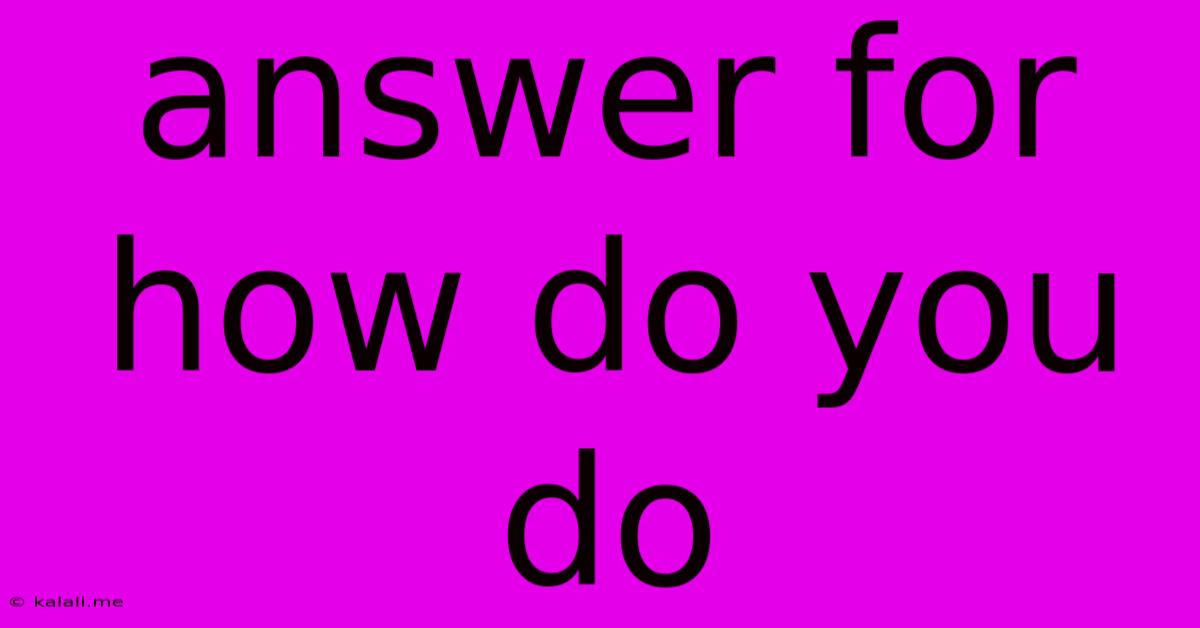Answer For How Do You Do
Kalali
May 19, 2025 · 3 min read

Table of Contents
How Do You Do? A Comprehensive Guide to This Classic Greeting
"How do you do?" It's a seemingly simple phrase, yet its meaning and proper response can be surprisingly nuanced. This classic greeting, often used in formal introductions, isn't a question asking about your well-being; it's a more formal way of saying hello. Understanding its subtleties can help you navigate social situations with confidence and grace. This article delves into the history, usage, and appropriate responses to this intriguing salutation.
The History and Evolution of "How Do You Do?"
While the exact origins are debated, "How do you do?" emerged in the 16th century. It evolved from a genuine inquiry about someone's health and well-being, gradually transforming into a purely formal greeting. Over time, the phrase lost its literal meaning, becoming a social convention rather than a sincere question. This evolution highlights the dynamic nature of language and how greetings adapt to societal changes. It's a testament to the enduring power of tradition, even when the original meaning fades.
Understanding the Context and Appropriateness
This formal greeting is typically reserved for:
- Formal introductions: Meeting someone for the first time in a professional or highly formal setting.
- More traditional or older generations: Some individuals, particularly older generations, still favor this phrasing in social situations.
- Specific cultural contexts: The formality of the phrase can vary depending on cultural norms.
It's generally not appropriate for:
- Informal settings: Casual conversations with friends, family, or colleagues you already know.
- Everyday encounters: Using it in a grocery store or on the street would feel overly formal and possibly odd.
The Correct Response: It's All About Reciprocity
The beauty of "How do you do?" lies in its reciprocal nature. The correct response is simply: "How do you do?" You repeat the phrase, acknowledging the greeting without necessarily inquiring about the other person's well-being. It's a polite acknowledgement, mirroring the formality of the initial greeting. Thinking of it as a formal handshake, rather than a question, can be helpful.
Alternatives to "How Do You Do?"
While "How do you do?" holds its place in formal settings, plenty of other greetings are suitable for various situations:
- Informal greetings: "Hi," "Hello," "Hey," "What's up?"
- More formal greetings (but less formal than "How do you do?"): "Good morning," "Good afternoon," "Good evening."
- Greetings emphasizing well-being: "How are you?" (requires a more detailed response)
Mastering Social Interactions: Etiquette and Nuance
Ultimately, mastering the use of "How do you do?" and other greetings involves understanding the social context. Consider the setting, your relationship with the other person, and the overall atmosphere to choose the most appropriate greeting. A well-chosen greeting can set a positive tone for any interaction.
In conclusion, "How do you do?" is more than just a phrase; it’s a glimpse into linguistic history and social etiquette. By understanding its proper usage and response, you'll enhance your communication skills and navigate social situations with poise and confidence. Remember, the key is to choose your greetings carefully, tailoring them to the specific circumstances and your relationship with the other person.
Latest Posts
Latest Posts
-
Photo Upload And Crop Widget Wordpress
May 19, 2025
-
Can You Use Washing Up Liquid To Wash A Car
May 19, 2025
-
How Long Does A Front End Alignment Take
May 19, 2025
-
To Be Thus Is Nothing But To Be Safely Thus
May 19, 2025
-
Difference Between A Minster And A Cathedral
May 19, 2025
Related Post
Thank you for visiting our website which covers about Answer For How Do You Do . We hope the information provided has been useful to you. Feel free to contact us if you have any questions or need further assistance. See you next time and don't miss to bookmark.